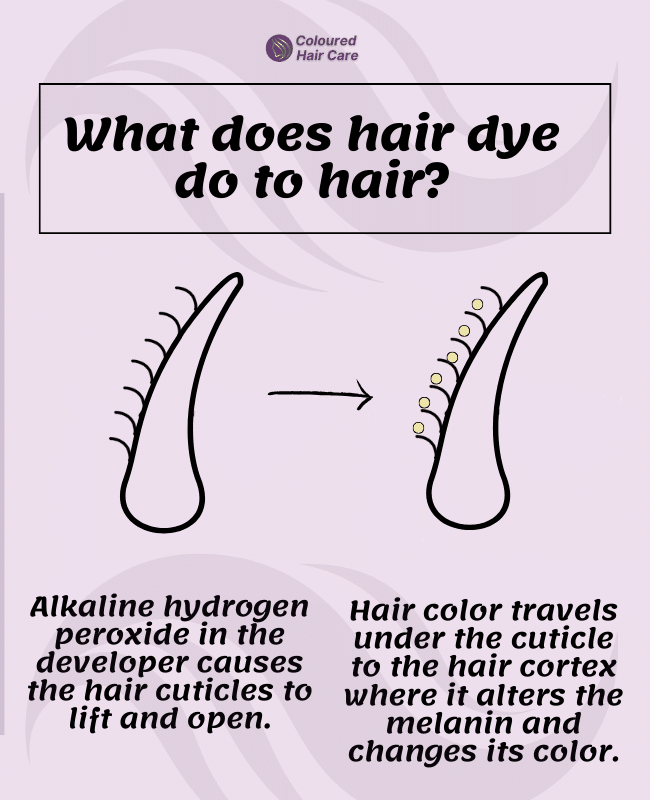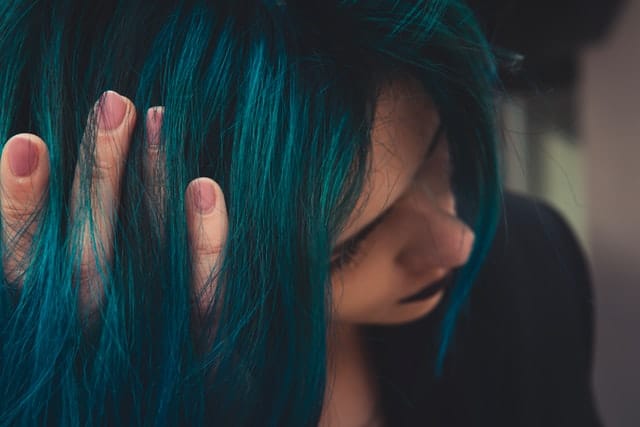You’re staring at a plug hole full of so much hair that it looks like the top of a tiny person’s head and you’re wondering – can hair dye cause hair loss?
It’s a common worry for those of us who dye our hair regularly.
Hair is such a major part of who we are and how we feel about ourselves. That’s why we dye it after all!
The good news is, while hair dye can certainly damage your hair, the chemicals used don’t actually penetrate your scalp deep enough to damage or kill off the root of your hair, causing hair loss.
Expert Insights
“In the 25+ years I’ve been dealing with hair in some capacity, I have never heard of anyone going completely bald because they dyed their hair too much.”
Karen Marie Shelton, CEO & Owner of Hairboutique.com
Table of Contents
The Link Between Hair Dye & Hair Loss: What the Science Says
The scientific evidence on hair dye and hair loss is mixed. Some studies have found a link between the two, while others have not.
A recent article published on PubMed reports: “Hair loss in the scalp due to hair dyes containing PPD is rare, and there have been only 2 reported cases of hair loss in the scalp due to a PPD allergy associated with dermatitis in a consumer-based study.”
Dr. Draelos of The Dermatology Times says: “Hair dyeing does not inhibit hair growth, but it may cause hair loss by damaging the hair that is color treated. Hair beneath the scalp that has not yet emerged cannot be reached by hair dye and thus hair dye cannot fundamentally cause hair loss, but hair shedding can increase with hair dyeing.”
One of the main reasons why hair dye may be linked to hair loss is that it can damage the hair shaft.
When hair dye is applied to the hair, it opens up the cuticle, which is the outermost layer of the hair shaft.
This allows the dye to penetrate the hair shaft and deposit color. However, it can also damage the hair shaft, making it more brittle and prone to breakage.
Another possible reason why hair dye may be linked to hair loss is that it can irritate the scalp.
This can lead to inflammation and scalp conditions such as seborrheic dermatitis, which can damage the hair follicles and lead to hair loss.
It is important to note that the link between hair dye and hair loss is not definitive. More research is needed to determine the exact mechanism by which hair dye may cause hair loss and to identify which types of hair dye are most likely to be harmful.
Understanding Hair Dye Chemistry.
Hair dye works by coating or penetrating your hair to change its color permanently, semi-permanently or temporarily.
Permanent hair dyes use strong oxidizing agents like hydrogen peroxide that help the color pigments penetrate deep into the hair shaft. This permanently transforms the melanin to alter your natural shade.
Semi-permanent dyes work a bit differently. They deposit colored pigments onto the surface of your hair, kind of like a coat of paint. Because these pigments can’t get inside the strand, they eventually fade and wash out over several weeks.
Temporary dyes are like a quick costume change for your hair. They have weak pigments that just stain the outside of your strands very temporarily. One shampoo, and the color washes away.
What none of these hair dyes do is alter or affect your hair in any way below your skin. Even if your hair dye goes out of date (you can still use it by the way).
What this means is that new hair that is ready to grow through is unaffected by hair dye, which is why we can rule it out as a cause of making anyone go bald.

Expert Insights
“If you notice that your scalp becomes excessively flaky and dry after using hair dye, give your scalp a gentle exfoliation to alleviate the issue. Start by shampooing your hair with a clarifying shampoo.
Then, combine 1/4 cup of moisturizing conditioner with 3 tablespoons of pure cane sugar. Divide your hair into 1/4 inch sections and apply the mixture directly to your scalp. Gently scrub each section for about 3 to 5 seconds before moving on to the next.
Repeat this process until you’ve scrubbed your entire scalp. Afterwards, thoroughly shampoo, condition, and style your hair as usual.”
Stephanie Johnson, Senior Cosmetologist/Trichologist
Watch and learn: How hair dye works.
Here’s a great video tutorial that guides you through the complex science behind how hair dye works in a simple way.
Expert Insights
“Hair dye does not cause hair loss per say but it can break the hairs close to the scalp, leaving random short hairs that can take a long time to grow back in, depending on how long your hair is.”
Tsippora Shainhouse, Dermatologist & Educator
Common Causes of Hair Loss.
So why is your hair falling out?
Well, it’s no surprise that the chemicals used in hair dye and the process itself can dry out and damage your hair.
Long time colored hair lovers like us know only too well how frequent styling, hot tools and hair dye make you look fabulous, but can be a frizz making combination.
So it’s natural to worry that it’s making your hair fall out too.
Hair dye can weaken your hair shaft, causing your hair to become brittle, lose its elasticity and snap.
This is how it can seem like you’re losing your hair, but in fact, it is your hair breaking off.
There are many other reasons your hair may be falling out that aren’t to do with hair dye including:
- Hormone imbalance
- Thyroid imbalance
- Pregnancy
- Nutrient deficiency
- Stress
- Toxin exposure
The American Academy of Dermatology (AAD) emphasizes the importance of addressing potential causes of hair loss, “If you experience hair loss, consulting with a board-certified dermatologist early can lead to better outcomes by determining the exact cause, whether it’s your hairstyle or another underlying issue like stress or genetics”
Expert Insights
“No, baldness is caused not because of dying hair but due to irregular sleep patterns, stress, poor food intake, hormone imbalance.”
Sreevidya Srinivasan, Hair Care and Skin Care Expert with Muthoot
How can I stop hair dye from damaging my hair?
A good hair care routine before and after you dye your hair, and using only the best products for dyed and colored hair will ensure your hair stays in tip top condition and your color lasts for longer.
This also means you’ll need to use hair dye less, causing less damage.
The type of hair dye you use can also make a difference so be sure to pick the right type for your needs. Bleach is particularly drying whereas semi-permanent and natural hair dyes are more gentle on the health of your hair.
TOP TIPS
- Hair loss can be caused by a number of factors, including stress and poor diet.
- One factor that is often overlooked is hair dye usage.
- It’s important to use a shampoo and conditioner made for color-treated hair when using hair dye in order to keep your scalp healthy.
- If you’re worried about losing your natural color or don’t want to risk damaging your scalp with chemical treatments, consider going lighter instead of darker with your new look.
- Using an all-natural product like henna on the roots will also help protect against damage from harsh dyes while still giving you some coverage if you’re looking for something low maintenance.
Expert Insights
“No. Hair dye itself will not contribute to loss of hair. Improper applications or expired products can. The loss of hair is most likely to happen from just about anything else. Stress is the more common factor (that I’ve come to know), followed by surgeries and medications. As long as the manufacturer’s directions are followed and stay within the new growth, you should be fine.”
Courtney Prewett, Former Lead Stylist at Fantastic Sams
Parting words.
So can hair dye cause hair loss? No.
Many people worry that hair dye can cause hair loss, but the truth is any change in your routine will have an impact on your locks.
These days there are plenty of natural and organic dyes available for those who want safer alternatives.
You can find out the answers to more common hair dye questions over on our FAQs page.
And as always, make sure you follow our advice in How to look after colored hair and keep it luscious for longer.
DISCLAIMER: The information provided in this article is intended for educational and informational purposes only and should not be considered as medical advice.
We’re here to help you make your hair color dreams come true, safely and stylishly. If you’ve got any more hair care questions or need some color inspiration, just drop us a message at @colouredhaircare on social media. Happy coloring!

